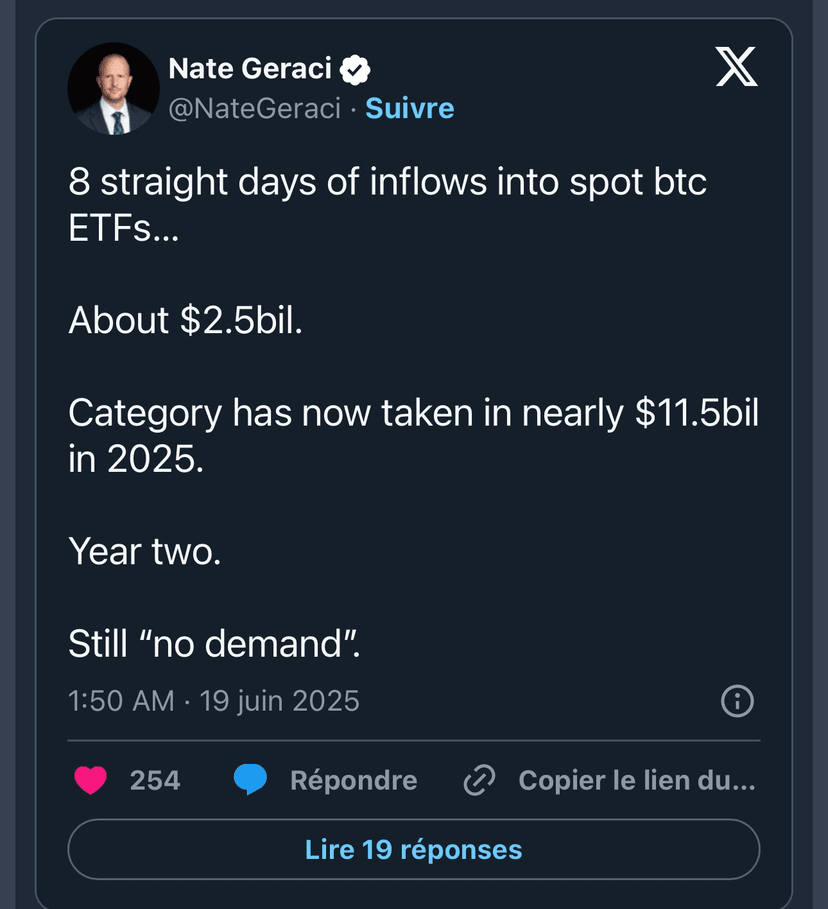Away from the spotlight, a massive influx is reshaping the landscape of crypto investment in the United States. In eight days, spot Bitcoin ETFs attracted $2.4 billion, despite a lackluster market. This sustained flow contrasts with the prevailing caution and reveals the growing anchoring of Bitcoin in institutional portfolios. Meanwhile, Ethereum, which has long been in catch-up mode, is showing signs of fatigue. Such a divergence raises questions about market priorities and upcoming strategies in the digital asset universe.
Spot Bitcoin ETFs have recorded a series of 8 consecutive days of net inflows, totaling $2.4 billion.
This bullish momentum comes despite an uncertain market context and moderate performance from Bitcoin's price.
Meanwhile, Ethereum ETFs are experiencing a significant slowdown after a phase of explosive growth lasting 19 days.
This retreat is partly explained by a tense macro context, the Fed's caution, and the absence of an immediate catalyst for Ethereum.
A Bitcoin dynamic supported by ETFs despite a tense market
U.S. spot ETFs have recorded a continuous bullish streak for eight days while the price of Bitcoin has evolved relatively stably, around $104,283 this Friday, down 2.5% for the week.
During this period, net inflows reached $2.4 billion, including $389.5 million on the single day of Wednesday. This trend does not reflect market euphoria, but rather a strategic consolidation by institutional investors.
As Nate Geraci, president of The ETF Store, highlights on X: "eight consecutive days of inflows into spot Bitcoin ETFs. The category has now amassed nearly $11.5 billion in 2025. It’s the second year, and still this idea that there would be 'no demand'.

Detailed flow figures confirm a strong concentration around the asset management giants:
BlackRock (IBIT) dominates the landscape with $278.9 million in flows on Wednesday, accounting for 96% of net inflows over the past eight days;
Fidelity (FBTC) follows with $104.4 million in inflows;
Bitwise (BITB), Grayscale BTC mini, and Hashdex (DEFI) garner $11.3M, $10.1M, and $1.2M respectively;
In parallel, Grayscale's GBTC fund records net outflows of $16.4 million, likely due to higher-than-average fees in the sector;
In total, spot Bitcoin ETFs have accumulated $46.9 billion in net flows since January 2024, with nearly $125 billion in assets under management.
These figures testify to an accelerated integration of Bitcoin into institutional portfolios, regardless of short-term volatility. The growing success of these products also highlights a structural shift in demand for cryptos, now considered as fully-fledged strategic diversification instruments.
Ethereum: institutional momentum is fading after a thunderous start
The contrast is striking on the Ethereum side. After a record sequence of 19 days that saw its spot ETFs rake in $1.4 billion in net inflows, the pace has suddenly slowed. On Wednesday, Ethereum ETFs attracted only $19.1 million, of which $15.1 million was allocated to BlackRock's sole ETHA fund.
Since their launch in July 2024, these products have still accumulated $3.9 billion in incoming flows, but the recent slowdown is concerning. "Data indicates that institutions remain confident in the bullish potential of cryptos in the medium term, but Ethereum's catch-up phase seems to be over," says Valentin Fournier, senior analyst at BRN.
Unlike Bitcoin, the trajectory of Ethereum ETFs appears more vulnerable to macroeconomic fluctuations. The weighing geopolitical context, combined with the Fed's restrictive posture, seems to have dampened investor enthusiasm.
The FOMC kept its rates unchanged on Wednesday but adopted a firm tone, according to Fournier, which heightens caution in the markets. In this climate, Ethereum lost 8.3% in a week to settle at $2,527, compared to a more moderate decline of 2.5% for Bitcoin. This difference in resilience could partly explain the gap in flows.
In the short term, this retreat of momentum on Ethereum could affect the perception of the asset as an institutional investment vehicle. Without a clear catalyst on the horizon, whether it be major technical updates or strengthened industrial use cases, ETH may suffer from a positioning perceived as less defensive than BTC. However, Ethereum continues to surprise the market, as more than 35.35 million ETH are now staked.

